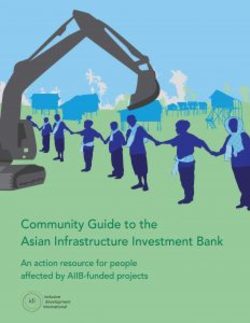Inclusive Development International | 7 February 2020
New tools help communities affected by AIIB projects defend their rights and the environment
(February 7, 2020) – Inclusive Development International has today released a new resource that equips communities and the activists who support them with information that can help them protect their rights when their lands, homes, livelihoods and environment are threatened by high-risk projects funded by the Asian Infrastructure Investment Bank. The Community Guide to the Asian Infrastructure Investment Bank is available here.
The Asian Infrastructure Investment Bank (AIIB) was established to provide financing for infrastructure projects across Asia. The bank hit the ground running in 2015 with a bold agenda to create a “lean, clean and green” multilateral development bank for the 21st century. That vision included a commitment to create an Environmental and Social Framework containing policies that would bind the bank, and standards that AIIB clients are expected to uphold in their projects. In late 2018, the AIIB took the next step towards accountability when it approved its policy for the Project-affected People’s Mechanism, which facilities dispute resolution or investigates the bank’s compliance with its environmental and social policies.
However, as a relatively new player in the multilateral development bank landscape, many affected communities and local civil society groups know little about the bank, its policies, or their options for redress if AIIB-funded projects cause harm. As of February 2020, the bank’s complaints mechanism has yet to be tested.
“In order to ensure that AIIB environmental and social standards are implemented and the bank is held accountable, local communities need to know about its policies, and civil society must have access to the information necessary to monitor project implementation,” said Mark Grimsditch, Inclusive Development International’s China Global Program Director.
The Community Guide seeks to close information gaps by explaining the background and approach of the AIIB, what environmental and social policies it has in place, and what people can do if they are affected or fear they will be affected by an AIIB project. The Facilitators’ Edition includes interactive exercises and discussion questions for use in workshops. These are aimed at guiding affected communities to apply the information to their own situations and develop strategies to defend their rights and protect their environment.
“We discuss using project-level complaint mechanisms, gathering evidence, raising issues directly with the AIIB, and using the bank’s grievance mechanism. We hope this will make it easier for affected communities and their civil society supporters to raise concerns and make their voices heard and, when necessary, to challenge harmful or potentially harmful projects,” said Grimsditch
Background: The Asian Infrastructure Investment Bank was established to provide financing for infrastructure projects across Asia and seeks to stimulate economic growth and improve connectivity. One hundred countries are now members. As of February 2020, the AIIB had approved over 64 projects in the energy, transport, urban, water and financial sectors across the region, and had invested in a small number of projects outside Asia. Investment in infrastructure is badly needed globally and these projects have the potential to bring important benefits, including improving access to services, markets and employment for poor communities. But large-scale infrastructure projects often have severe negative impacts on the environment and on local people. They can pollute rivers, destroy forests, and affect the health and livelihoods of local residents. Big infrastructure projects can displace entire communities and affect the territories and natural resources of Indigenous Peoples.













